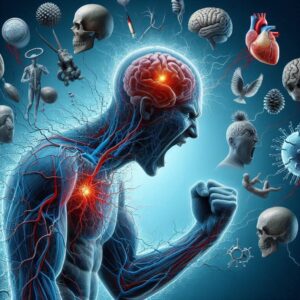Transform Your Anger: Strategies for Channeling Emotions into Positive Actions
Anger is an essential and powerful human emotion that everyone experiences at different points in their lives. This intense feeling can arise from various situations such as personal attacks, feelings of betrayal, or frustration. Understanding the complex nature of anger is crucial for fostering personal development and emotional self-regulation. By uncovering the origins and triggers of this emotion, individuals can embark on a transformative journey toward healthier emotional responses and enhanced mental well-being, ultimately leading to a more fulfilling life.
It’s vital to recognize that experiencing anger is not inherently negative; the key lies in how we express and manage this powerful emotion. Anger can manifest in numerous ways, from mild irritation and annoyance to deep-seated resentment and explosive rage. These varying expressions can significantly impact our relationships and overall mental health. By developing a heightened awareness of these expressions, individuals can navigate their emotional landscape more effectively and cultivate healthier interactions with others, promoting stronger and more meaningful connections.
Physiological signs of anger may include a racing heart, increased blood pressure, and muscle tension. If left unaddressed, this emotion can escalate into destructive behaviors that jeopardize personal relationships, career opportunities, and overall life satisfaction. Recognizing the symptoms of anger and understanding its root causes are critical steps in effectively managing this potent emotion, ensuring it remains a manageable part of life rather than a controlling force.
Triggers for anger can stem from a wide range of sources, including external circumstances, internal thoughts and feelings, and physiological responses. By exploring these triggers, individuals can gain deeper insights into their anger, laying the groundwork for developing effective coping strategies. This introspective journey enhances personal growth and emotional intelligence, enabling individuals to respond proactively and constructively in challenging situations, thus leading to healthier emotional management.
Key Strategies for Effectively Managing and Mastering Anger
- Understand that feeling anger is a natural emotional response that can become problematic without effective management.
- Unchecked anger can have serious repercussions for both mental and physical health, necessitating proactive strategies.
- Participating in anger management therapy provides individuals with crucial tools for expressing anger healthily and constructively.
- Therapeutic techniques, including deep breathing exercises and enhanced communication skills, are introduced to navigate emotional challenges.
- Therapy aids in identifying personal triggers and underlying issues that contribute to anger, promoting self-awareness.
 The Serious Health Risks of Unmanaged Anger
The Serious Health Risks of Unmanaged Anger
Exploring the Physical Health Consequences of Persistent Anger
Extensive studies have established a profound connection between chronic anger and a range of serious health complications. These issues may manifest as high blood pressure, cardiovascular diseases, and a weakened immune system, all of which heighten the risk of strokes and other severe health incidents. Furthermore, ongoing anger can lead to debilitating conditions such as irritable bowel syndrome, insomnia, and tension headaches, which not only disrupt daily functioning but can also have long-lasting effects on overall health and wellness.
Understanding How Uncontrolled Anger Affects Mental Health and Personal Relationships
The repercussions of unmanaged anger extend well beyond physical health, posing significant challenges to mental well-being. Chronic anger can be a precursor to anxiety disorders, depression, and substance abuse issues. Additionally, it can lead to strained relationships, resulting in conflicts and emotional distance from loved ones, thereby perpetuating a cycle of isolation and emotional turmoil that can be challenging to break free from.
Recognizing the Importance of Support: Developing Effective Anger Management Skills
Understanding the harmful effects of uncontrolled anger on both mental and physical health underscores the critical need for seeking help and acquiring effective anger management strategies. Individuals must confront the harsh reality that unchecked anger can threaten their overall well-being. By comprehending the long-term consequences of persistent anger, individuals may be motivated to actively pursue constructive approaches and support systems that foster healthy emotional expression and management, paving the way for improved mental health.
Unlock the Transformative Potential of Anger Management Therapy
Engaging in anger management therapy offers numerous benefits for those struggling with intense feelings of anger. One significant advantage is the opportunity to explore the underlying causes of anger while learning practical coping strategies. During therapy sessions, individuals can assess what triggers their anger, fostering a deeper understanding of their emotional responses and reactions, which is vital for long-term emotional health.
This increased self-awareness is crucial for developing effective anger management techniques. Therapy provides a safe and supportive environment for individuals to reflect on their emotions and discover healthier ways to express and cope with anger. Clients not only gain insights into their emotional states, but they also learn essential communication skills that can enhance relationships and minimize conflict. By empowering individuals to take control of their emotions, anger management therapy can lead to a more balanced and fulfilling life.
Moreover, anger management therapy plays a critical role in helping individuals break free from destructive behaviors often associated with uncontrolled anger. By interrupting harmful patterns, clients can regain control over their lives and cultivate healthier, more satisfying relationships. Through implementing effective coping strategies and stress management techniques, individuals can mitigate the adverse effects of anger on their mental and physical health. Ultimately, the profound benefits of anger management therapy can facilitate lasting positive changes in an individual’s life.
 Comprehensive Techniques and Strategies Offered in Anger Management Therapy
Comprehensive Techniques and Strategies Offered in Anger Management Therapy
Anger management therapy equips clients with a variety of effective techniques and strategies for channeling their anger in constructive ways. One widely practiced method is deep breathing exercises, which help individuals regulate their physiological responses to anger while simultaneously reducing stress and tension. Mindfulness meditation is another powerful technique introduced in therapy, encouraging individuals to focus on the present moment and cultivate greater awareness of their thoughts and emotions.
Cognitive restructuring is a fundamental aspect of anger management therapy. This approach focuses on identifying and challenging negative thought patterns, replacing them with more rational and balanced perspectives. By reframing their perceptions of triggering situations, individuals can learn to respond to anger in a more positive and constructive manner. Additionally, therapy often incorporates problem-solving skills to assist clients in effectively addressing the root causes of their anger.
Furthermore, assertiveness training is commonly integrated into anger management therapy, empowering individuals to express their needs and set healthy boundaries in a respectful manner. Those who master these techniques and strategies in therapy develop a versatile toolkit for managing their anger in various contexts, enhancing their adaptability and emotional resilience.
Exploring Triggers and Roots of Anger Through Therapeutic Insights
Therapeutic sessions provide individuals the opportunity to examine the specific triggers and underlying issues that contribute to their anger. By reflecting on various situations, thoughts, and emotions, clients gain valuable insights into what ignites their anger. Recognizing these triggers allows individuals to identify early warning signs before they escalate into uncontrollable rage, enabling proactive management of their emotions.
Therapy serves as a vital resource for those seeking to pinpoint their anger triggers and address the core issues that fuel these feelings. This process often involves examining past experiences, traumas, or learned behaviors that influence emotional responses. Effectively confronting these underlying factors can lead to significant breakthroughs in healing emotional wounds and fostering a sense of peace and emotional stability.
In a therapeutic setting, individuals are provided with a safe space to explore their triggers and underlying concerns without fear of judgment or criticism. This journey of self-exploration can be empowering, equipping clients with the necessary tools to manage and channel their anger in healthy, constructive ways.
The Essential Role of Cognitive Behavioral Therapy in Effective Anger Management
Confronting and Correcting Irrational Beliefs to Cultivate Rational Thinking
Cognitive Behavioral Therapy (CBT) is designed to confront irrational beliefs and replace them with logical, balanced thought processes. By identifying and addressing cognitive distortions, individuals can develop a more constructive and realistic perspective on situations that trigger their anger, leading to healthier emotional responses and interactions.
Gaining Practical Coping Strategies for Daily Anger Management
Beyond recognizing cognitive distortions, CBT empowers individuals with practical strategies for effectively managing anger. Techniques such as relaxation exercises, assertiveness training, and problem-solving skills are essential for addressing the root causes of anger. These strategies equip individuals with actionable tools that can be applied in everyday situations, facilitating better regulation and management of their emotional responses.
Boosting Self-Awareness for Enhanced Emotional Regulation
Additionally, CBT enhances self-awareness by helping individuals understand the connections between their thoughts, emotions, and behaviors. Gaining clarity about these relationships allows individuals to manage their emotional reactions to anger-triggering situations more effectively. Mastering effective anger management is crucial for fostering emotional regulation and overall well-being. Cognitive Behavioral Therapy plays a significant role in this process, equipping individuals with the necessary skills to navigate their anger and improve their quality of life.
 Ensuring Lasting Success: Ongoing Support and Resources After Therapy
Ensuring Lasting Success: Ongoing Support and Resources After Therapy
For those who have completed anger management therapy, it is crucial to continue seeking support and utilizing available resources to maintain personal growth. To further enhance anger management skills, individuals may consider joining support groups or participating in one-on-one counseling sessions. Support groups offer a wonderful opportunity to connect with others facing similar challenges, fostering a sense of community and mutual understanding. These groups create a supportive environment for sharing experiences and learning from one another, helping to alleviate feelings of isolation and promoting a sense of belonging.
In addition to ongoing support, individuals can tap into various resources, including self-help books, online platforms, and mobile applications specifically designed to aid in effective anger management. These tools provide additional strategies and methods for practicing healthy coping mechanisms outside of therapy sessions. Furthermore, sustaining progress after therapy may require lifestyle changes that promote overall well-being, such as engaging in regular physical activity, maintaining balanced nutrition, ensuring adequate sleep, and adopting stress-reduction practices.
Incorporating these lifestyle adjustments into daily routines can significantly lessen the likelihood of experiencing overwhelming anger. Understanding and managing the powerful emotion of anger is essential for maintaining personal control. The consequences of uncontrolled anger can severely impact both mental and physical health, reinforcing the need for seeking help through anger management therapy. This comprehensive understanding equips individuals with the knowledge and tools needed to effectively navigate their emotions.
Therapy serves as a vital resource for individuals grappling with the complexities of uncontrolled anger. It empowers them to understand their emotional triggers, confront underlying issues, and acquire practical strategies while providing the essential support for enduring progress. By equipping individuals with the knowledge and tools to manage their anger, therapy encourages healthier coping mechanisms and enhances overall emotional well-being.
Presented By:
References
- Teen Addiction Treatment Ames Iowa | Ember Recovery. https://emberrecovery.org/teen-addiction-treatment-in-iowa/
- Why Men Should Not Cover Up Their Emotional Distress | TheBeardMag. https://www.thebeardmag.com/lifestyle/health/why-men-should-not-cover-up-their-emotional-distress/
The Article: Interventions for Anger Management appeared first on Anger Management Leyland.
The Article Managing Anger: Proven Strategies for Success appeared first on https://mcrtherapies.com
The Article Proven Strategies for Success in Managing Anger Was Found On https://limitsofstrategy.com

